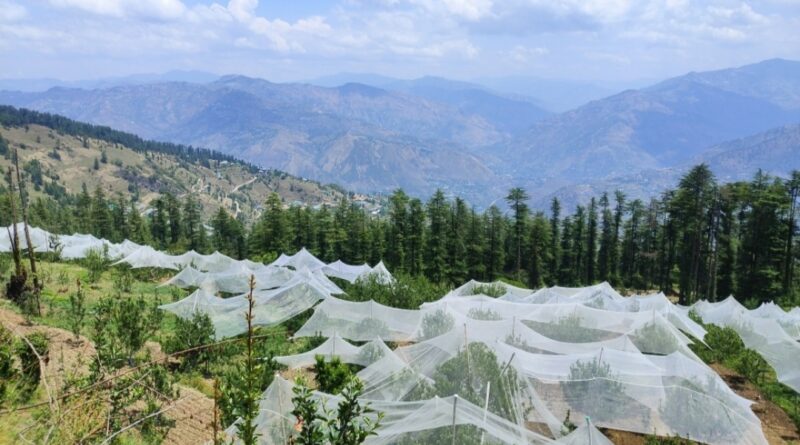Storms, Hail, and Hope: How Himachal’s Farmers Are Fighting Back with Anti-Hail Nets
In the hills of Himachal Pradesh, the weather has turned unpredictable—and for farmers and orchardists, that means trouble. Storms, strong winds, and hailstorms are not just a seasonal nuisance; they’re a serious threat to livelihoods. Fruit trees and vegetable crops are taking the brunt of nature’s fury, and the damage is costing the farming community dearly—over ₹1,000 crore every year.
But amid the chaos, a quiet revolution is taking place in the orchards: anti-hail nets are becoming the farmers’ new best friend.
A Simple Net, A Powerful Shield
These nets, stretched over apple trees and other fruit crops, act as a protective barrier against hail and harsh winds. In districts like Shimla, Kullu, and Sirmaur, more and more farmers are embracing this solution. What started gaining traction in the 1990s has now become a widespread practice, especially in apple-rich regions.
Amit Sharma, a local horticulturist, recalls how anti-hail nets became popular in India post-1970 and in Himachal after 1990. “Today, they’re not just a trend—they’re a necessity,” he says.
Government Support Makes It Possible
Recognizing the need, the Himachal government has stepped in with generous support. Under the Anti-Hail Net Scheme, farmers can get up to 80% subsidy to cover their orchards. A newer initiative, the Crop Production Protection Scheme, also offers similar benefits. Farmers need to purchase the nets from approved vendors, submit the required documents, and the subsidy is directly credited to their accounts.
Prices vary from ₹30 to ₹80 per square meter, depending on quality, but with the subsidy, the nets become affordable and accessible.
Real Impact on the Ground
In Kullu district alone, 250 orchardists installed anti-hail nets in 2024–25, receiving ₹2.41 crore in subsidies. Between 2021 and 2023, over 20,000 farmers benefited from nearly ₹14 crore in support.
And the results? Remarkable. Farmers like Yashwant Thakur and Tilak Raj report that where hail once destroyed up to 60% of their crops, now their produce is safe. Even storm-related damage to tree branches has reduced significantly.
More Than Just Hail Protection
These nets also keep birds at bay—another common threat to apple and persimmon crops. Made from strong yet flexible HDPE monofilament, the nets are designed to withstand harsh weather while being easy to install over trees of varying sizes.
A Boost to Himachal’s Economy
With apple farming contributing ₹6,000 crore to the state’s economy, protecting these crops is vital. In Kullu alone, apples are grown on 28,000 hectares, with other fruits covering another 4,000 hectares. As more farmers turn to Japanese persimmons and other high-value crops, the need for protection grows.
Thanks to anti-hail nets and government support, farmers are not just surviving the storm—they’re learning to thrive through it.



